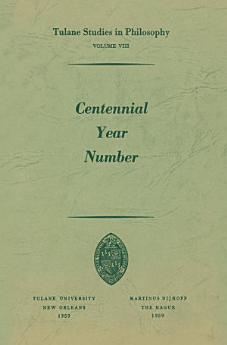Centennial Year Number
James K. Feibleman · Paul G. Morrison · Andrew J. Reck · Harold N. Lee · Edward G. Ballard · Richard L. Barber · Carl H. Hamburg · Robert C. Whittemore
Dec 2012 · Springer Science & Business Media
Ebook
132
Pages
reportRatings and reviews aren’t verified Learn More
About this ebook
The year 1959 has been called The Centennial Year in view of the anniversary of the publication of The Origin of SPecies and the centenary of the births of many who later contributed much to the philosophy of the recent past, such as Samuel Alexander, Henri Bergson, John Dewey and Edmund Husser!' The essays in the present volume which are on subjects germane to any of the anniversaries celebrated this year have been placed first in the present volume. CENTENNIAL YEAR NUMBER DARWIN AND SCIENTIFIC METHOD JAMES K. FEIBLEMAN The knowledge of methodology, which is acquired by means of formal education in the various disciplines, is usually com municated in abstract form. Harmony and counterpoint in musical composition, the axiomatic method of mathematics, the established laws in physics or in chemistry, the principles of mathematics - all these are taught abstractly. It is only when we come to the method of discovery in experimental science that we find abstract communication failing. The most recent as well as the greatest successes of the experimental sciences have been those scored in modern times, but we know as yet of no abstract way to teach the scientific method. The astonishing pedagogical fact is that this method has never been abstracted and set forth in a fashion which would permit of its easy acquisition. Here is an astonishing oversight indeed, for which the very difficulty of the topic may itself be responsible.
About the author
Born in New Orleans, Louisiana, in 1904, James Feibleman is a prolific author who has published nearly 50 books of poetry, novels, autobiography, but mostly serious philosophy. He attended the University of Virginia for several years, but did not graduate. From 1925 to 1929, Feibleman was the assistant manager of a department store. He then resumed his education in Europe during the 1930s. During World War II, Feibleman was a professor of English at Tulane University, later becoming chair of the department of philosophy from 1952 to 1969. His major endeavor was formulating a system of philosophy that rested on the ontological foundations of realism harking back to Plato the idea that there is an a priori argument for existence but that incorporated modern science. The outline of Feibleman's system was expounded in his massive Ontology (1951) but was elaborated in a number of volumes in special areas such as aesthetics, ethics, political philosophy, and legal philosophy. Feibleman also published several books on popular philosophy. In addition to his active career in philosophy, Feibleman was a successful businessman. From 1930 until 1954, he was vice president and general manager of James K. Feibleman Realty Company. He was a major partner in the Leopold Investment Company (1954-1971).
Rate this ebook
Tell us what you think.
Reading information
Smartphones and tablets
Install the Google Play Books app for Android and iPad/iPhone. It syncs automatically with your account and allows you to read online or offline wherever you are.
Laptops and computers
You can listen to audiobooks purchased on Google Play using your computer's web browser.
eReaders and other devices
To read on e-ink devices like Kobo eReaders, you'll need to download a file and transfer it to your device. Follow the detailed Help Center instructions to transfer the files to supported eReaders.







